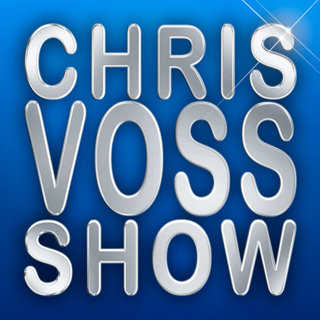
The Chris Voss Show Podcast – Black Joy: Stories of Resistance, Resilience, and Restoration by Tracey Michae’l Lewis-Giggetts
Black Joy: Stories of Resistance, Resilience, and Restoration by Tracey Michae’l Lewis-Giggetts With deeply personal and uplifting essays in the vein of Black Girls Rock, You Are Your Best Thing, and I Really Needed This Today, this is “a necessary testimony on the magic and beauty of our capacity to live and love fully and out loud” (Kerry Washington). When Tracey M. Lewis-Giggetts wrote an essay on Black joy for The Washington Post, she had no idea just how deeply it would resonate. But the outpouring of positive responses affirmed her own lived experience: that Black joy is not just a weapon of resistance, it is a tool for resilience. With this book, Tracey aims to gift her community with a collection of lyrical essays about the way joy has evolved, even in the midst of trauma, in her own life. Detailing these instances of joy in the context of Black culture allows us to recognize the power of Black joy as a resource to draw upon, and to challenge the one-note narratives of Black life as solely comprised of trauma and hardship. “Lewis-Giggetts etches a stunning personal map that follows in her ancestors’ footsteps and highlights their ability to take control of situational heartbreak and tragedy and make something better out of it….A simultaneously gorgeous and heartbreaking read” (Kirkus Reviews, starred review).
9 Maalis 202238min

The Chris Voss Show Podcast – Majority Minority by Justin Gest
Majority Minority by Justin Gest How do societies respond to great demographic change? This question lingers over the contemporary politics of the United States and other countries where persistent immigration has altered populations and may soon produce a majority minority milestone, where the original ethnic or religious majority loses its numerical advantage to one or more foreign-origin minority groups. Until now, most of our knowledge about largescale responses to demographic change has been based on studies of individual people's reactions, which tend to be instinctively defensive and intolerant. We know little about why and how these habits are sometimes tempered to promote more successful coexistence. To anticipate and inform future responses to demographic change, Justin Gest looks to the past. In Majority Minority, Gest wields historical analysis and interview-based fieldwork inside six of the world's few societies that have already experienced a majority minority transition to understand what factors produce different social outcomes. Gest concludes that, rather than yield to people's prejudices, states hold great power to shape public responses and perceptions of demographic change through political institutions and the rhetoric of leaders. Through subsequent survey research, Gest also identifies novel ways that leaders can leverage nationalist sentiment to reduce the appeal of nativism--by framing immigration and demographic change in terms of the national interest. Grounded in rich narratives and surprising survey findings, Majority Minority reveals that this contentious milestone and its accompanying identity politics are ultimately subject to unifying or divisive governance.
9 Maalis 202235min

The Chris Voss Show Podcast – Roger Williams of The Crossing It Off Podcast
Roger Williams of The Crossing It Off Podcast Subscribe to the podcast at: Podcasts.apple.com
8 Maalis 202228min

The Chris Voss Show Podcast – Bad Faith: Race and the Rise of the Religious Right by Randall Balmer
Bad Faith: Race and the Rise of the Religious Right by Randall Balmer A surprising and disturbing origin story There is a commonly accepted story about the rise of the Religious Right in the United States. It goes like this: with righteous fury, American evangelicals entered the political arena as a unified front to fight the legality of abortion after the Supreme Court’s 1973 Roe v. Wade decision. The problem is this story simply isn’t true. Largely ambivalent about abortion until the late 1970s, evangelical leaders were first mobilized not by Roe v. Wade but by Green v. Connally, a lesser-known court decision in 1971 that threatened the tax-exempt status of racially discriminatory institutions—of which there were several in the world of Christian education at the time. When the most notorious of these schools, Bob Jones University, had its tax-exempt status revoked in 1976, evangelicalism was galvanized as a political force and brought into the fold of the Republican Party. Only later, when a more palatable issue was needed to cover for what was becoming an increasingly unpopular position following the civil rights era, was the moral crusade against abortion made the central issue of the movement now known as the Religious Right. In this greatly expanded argument from his 2014 Politico article “The Real Origins of the Religious Right,” Randall Balmer guides the reader along the convoluted historical trajectory that began with American evangelicalism as a progressive force opposed to slavery, then later an isolated apolitical movement in the mid-twentieth century, all the way through the 2016 election in which 81 percent of white evangelicals coalesced around Donald Trump for president. The pivotal point, Balmer shows, was the period in the late 1970s when American evangelicals turned against Jimmy Carter—despite his being one of their own, a professed “born-again” Christian—in favor of the Republican Party, which found it could win their loyalty through the espousal of a single issue. With the implications of this alliance still unfolding, Balmer’s account uncovers the roots of evangelical watchwords like “religious freedom” and “family values” while getting to the truth of how this movement began—explaining, in part, what it has become.
6 Maalis 202250min

The Chris Voss Show Podcast – Ana Lennyr, Family Relationships Mentor & Life Strategist
Ana Lennyr, Family Relationships Mentor & Life Strategist Analennyr.com
6 Maalis 202225min

The Chris Voss Show Podcast – Decide and Conquer: 44 Decisions that will Make or Break All Leaders by David Siegel
Decide and Conquer: 44 Decisions that will Make or Break All Leaders by David Siegel Success boils down to one thing: making good decisions. Learn the right framework now that can make all the difference later when faced with terrible options, deep anxiety and fear of failure. Access the decision framework David Siegel used when he took over as CEO of Meetup, the world’s leading platform for making connections and finding your community. Let David’s success during one of the most tumultuous times in his company’s history help guide you on your own path. Decide and Conquer helps all leaders navigate the big decisions that will impact their future and make their organizations a success. David outlines the 44 challenges leaders face when starting a new position, then shows you the decision framework he applied to overcome challenges in his own role. David takes you on an epic journey of corporate and personal survival that includes industry titans like Adam Neumann, Barry Diller, Jack Welch, Bill Ackman, and other leaders. In Decide and Conquer, you will learn to: Apply principles like open communication, transparency, and kindness to inform great decision making. Set yourself up to succeed, even before you start, by removing potential roadblocks before they become a problem. Be a bold and decisive leader and not succumb to fear. By applying the principles he had learned in previous leadership positions, David was able to make the many critical decisions that would mean life or death for Meetup when WeWork decided to sell the company. From deciding to accept the position and negotiating terms to managing a seemingly endless series of crises during the sale and global pandemic, Decide and Conquer walks readers through the key decisions they will face with invaluable advice for each one.
4 Maalis 202236min

The Chris Voss Show Podcast – Grief: A Philosophical Guide by Michael Cholbi
Grief: A Philosophical Guide by Michael Cholbi An engaging and illuminating exploration of grief―and why, despite its intense pain, it can also help us grow Experiencing grief at the death of a person we love or who matters to us―as universal as it is painful―is central to the human condition. Surprisingly, however, philosophers have rarely examined grief in any depth. In Grief, Michael Cholbi presents a groundbreaking philosophical exploration of this complex emotional event, offering valuable new insights about what grief is, whom we grieve, and how grief can ultimately lead us to a richer self-understanding and a fuller realization of our humanity. Drawing on psychology, social science, and literature as well as philosophy, Cholbi explains that we grieve for the loss of those in whom our identities are invested, including people we don't know personally but cherish anyway, such as public figures. Their deaths not only deprive us of worthwhile experiences; they also disrupt our commitments and values. Yet grief is something we should embrace rather than avoid, an important part of a good and meaningful life. The key to understanding this paradox, Cholbi says, is that grief offers us a unique and powerful opportunity to grow in self-knowledge by fashioning a new identity. Although grief can be tumultuous and disorienting, it also reflects our distinctly human capacity to rationally adapt as the relationships we depend on evolve. An original account of how grieving works and why it is so important, Grief shows how the pain of this experience gives us a chance to deepen our relationships with others and ourselves.
4 Maalis 202239min

The Chris Voss Show Podcast – The Amazon Way: Amazon’s 14 Leadership Principles by John Rossman
The Amazon Way: Amazon's 14 Leadership Principles by John Rossman The 3rd edition of The Amazon Way is one of the rare business leadership books giving actionable insights for innovation and business growth to be the basis for your digital transformation gameplan. The Amazon Way translates Amazon's unique culture and management practices into insights and opportunities, as only an Amazon executive and expert advisor could do for the Amazon Leadership Principles giving readers one of the essential business leadership books for the digital era. Peppered with humorous and enlightening firsthand anecdotes with Jeff Bezos from the author’s career at Amazon, this revealing business guide is also filled with the valuable lessons that have served Jeff Bezos’ “everything store” so well—providing expert advice for aspiring entrepreneurs, CEOs, and investors. The author was responsible for launching the Amazon Marketplace business and had accountability for the enterprise services business. Since leaving Amazon, Rossman has worked across every industry sector and with companies of all sizes to create business and product strategies, approaches to scale leadership, culture and innovation. It’s this combination of Amazon insider experience coupled with a vast portfolio of helping other businesses compete which make The Amazon Way a guide for anyone looking to compete in the digital era. The 3rd edition has many new and updated sections. This includes a new foreword from Tom Alberg, managing partner at Madrona Venture Group. Tom was on the board of directors at Amazon for 23 years. A new preface is included suggesting a vital strategy for Amazon and the leadership teams for all companies. The Amazon Way is on a short list of essential business leadership books and should be a key addition to business leadership programs to develop a culture of growth and innovation. If you are interviewing at Amazon or for current Amazon employees, The Amazon Way will be an invaluable asset for your success. The Amazon Way doesn't just explain the Amazon Leadership Principles, but gives tools, mechanisms and atomic habits to create change in a team or business. The leadership principles and examples include customer obsession, long-term thinking, think big, working backwards and the future press release, bias for action, earn trust and free cash flow. Praise for The Amazon Way "In this new edition, John Rossman provides an updated, in-depth and invaluable view of the principles that are fueling Amazon's extraordinary business success. John's suggestion to add a new principle focused on the Golden Rule is a great one for every company, as, more than ever, we need business to serve the common good!" - Hubert Joly, former chairman and CEO of Best Buy, author The Heart of Business - Leadership Principles for the Next Era of Capitalism "In The Amazon Way, John Rossman brilliantly illuminates Amazon's secretive corporate culture, using HIS rare insider's perspective to show how Jeff Bezos has created unique systems that facilitate good decision making at all levels of his company" -- Brad Stone, author of The Everything Store and Amazon Unbound
3 Maalis 202224min





















